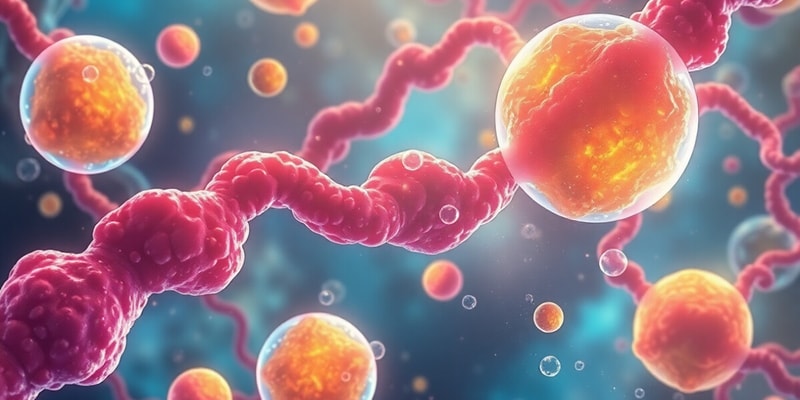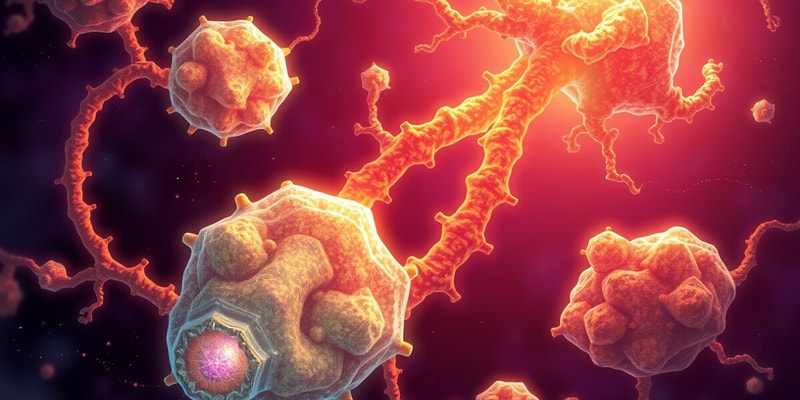Podcast Beta
Questions and Answers
What is the primary enzyme responsible for the phosphorylation of fructose?
In which organ does the majority of fructose metabolism occur?
What is the product of the cleavage of fructose-1-phosphate?
Which of the following statements describes fructokinase?
Signup and view all the answers
What condition arises from a deficiency of fructokinase?
Signup and view all the answers
What intermediate does DHAP represent in fructose metabolism?
Signup and view all the answers
Which enzyme cleaves fructose-1-phosphate into its components?
Signup and view all the answers
Which of the following tissues contains hexokinase for fructose conversion?
Signup and view all the answers
Which inherited disorder is characterized by hereditary fructose intolerance?
Signup and view all the answers
What is the primary metabolic state known as when fasting lasts longer than 12 hours?
Signup and view all the answers
Which hormones primarily regulate glucose production during fasting?
Signup and view all the answers
What happens to glycogenolysis after 15 hours of fasting?
Signup and view all the answers
What substrates are key for gluconeogenesis as fasting continues?
Signup and view all the answers
During the fed state, what is the primary function of insulin?
Signup and view all the answers
Which of the following statements about sucrase is incorrect?
Signup and view all the answers
What is the process that phosphorylates glyceraldehyde?
Signup and view all the answers
Which product is formed from the phosphorylation of glyceraldehyde?
Signup and view all the answers
What can glyceraldehyde-3-phosphate be further converted to?
Signup and view all the answers
Which enzyme cleaves fructose-1-phosphate?
Signup and view all the answers
What intermediate is produced from dihydroxyacetone phosphate?
Signup and view all the answers
Which metabolic pathway can glyceraldehyde-3-phosphate NOT directly enter?
Signup and view all the answers
What type of substrate is glyceraldehyde in this metabolic process?
Signup and view all the answers
Which of the following describes a path for glyceraldehyde metabolism?
Signup and view all the answers
What is the starting substrate for the phosphorylation process in fructose metabolism?
Signup and view all the answers
Which product can glyceraldehyde-3-phosphate be converted into through gluconeogenesis?
Signup and view all the answers
What is the role of fructose 1,6 bisphosphate in glycolysis?
Signup and view all the answers
Which molecule is produced during the payoff phase of glycolysis?
Signup and view all the answers
What hormone induces the activity of 1,6-bisphosphatase in the fed state of adipose tissues?
Signup and view all the answers
What regulates PFK-1 activity in glycolysis?
Signup and view all the answers
What process primarily provides energy to erythrocytes given they lack mitochondria?
Signup and view all the answers
Which enzyme is induced by glucagon, epinephrine, and cortisol during fasting?
Signup and view all the answers
Substrate-level phosphorylation occurs in which phase of glycolysis?
Signup and view all the answers
What stimulates the activity of PFK-1?
Signup and view all the answers
What is the consequence of insulin acting on the PEPCK enzyme?
Signup and view all the answers
What happens when the cell has an ample supply of ATP?
Signup and view all the answers
Which statement about glucose entry into red blood cells is accurate?
Signup and view all the answers
Which process is NOT a characteristic of the fed state in the brain?
Signup and view all the answers
How many molecules of G3P are involved in the reactions from step 6 to step 10 of glycolysis?
Signup and view all the answers
Which factor does NOT inhibit PFK-1?
Signup and view all the answers
What is the main fate of fatty acids taken up by cells in the fed state?
Signup and view all the answers
Fructose 2,6-bisphosphatase activity is activated when it is:
Signup and view all the answers
Which process occurs during substrate-level phosphorylation?
Signup and view all the answers
In terms of energy gain, what is the primary mechanism during the payoff phase of glycolysis?
Signup and view all the answers
During fasting, what effect does glucagon have on glycolysis in the liver?
Signup and view all the answers
What does pyruvate convert to after glycolysis in red blood cells?
Signup and view all the answers
Study Notes
Fructose Metabolism
- Fructose is the second most common sugar in the adult diet
- Primarily ingested as a monosaccharide or as part of sucrose
- Found in fruits, honey, and corn syrups
- Mostly metabolized in the liver
- Also metabolized in the small intestinal mucosa and proximal epithelium of the renal tubule
Fructose Metabolism Enzymes
- Fructokinase is the major kinase involved in fructose metabolism
- Fructokinase has a high Vmax and is found in the liver
- Hexokinase (I, II, III) are also involved in fructose metabolism
- Hexokinase has a high Vmax and is found in muscle and adipose tissue
- Hexokinase converts fructose to fructose-6-phosphate
Fructose-1-Phosphate Cleavage
- Fructose-1-phosphate is cleaved into dihydroxyacetone phosphate (DHAP) and glyceraldehyde by aldolase-B
- DHAP is a glycolytic intermediate
- Glyceraldehyde can be converted to glyceraldehyde-3-phosphate (G3P) by triose kinase
Fructose Metabolism Summary
- Fructose is phosphorylated to fructose-1-phosphate by fructokinase
- Fructose-1-phosphate is cleaved into DHAP and glyceraldehyde by aldolase-B
- DHAP can enter the glycolytic pathway directly
- Glyceraldehyde can be converted to G3P, which can also enter the glycolytic pathway
Inherited Disorders of Fructose Metabolism
- Essential fructosuria is caused by a deficiency in fructokinase
- Hereditary fructose intolerance is caused by a deficiency in aldolase-B
Fed State vs Fasting State
- Fed state (postprandial) occurs within 4 hours after a meal
- Insulin stimulates glucose uptake and metabolism
- Insulin promotes glycolysis and glycogenesis
- Fasting state (post-absorptive) occurs after 6-12 hours of fasting
- Prolonged fasting (starvation) occurs after more than 12 hours of fasting
- Glucagon stimulates gluconeogenesis and glycogenolysis
- Glucagon inhibits glycolysis and glycogenesis
Gluconeogenesis
- The liver switches from glucose utilization to glucose production during fasting
- The key substrates for gluconeogenesis are alanine, lactate, and glycerol
- Alanine and lactate are transported to the liver from muscle
- Glycerol is released from the hydrolysis of triacylglycerols (lipolysis) by the hormone-sensitive lipase, which is stimulated by glucagon
- Gluconeogenesis increases with duration of fasting
Glycogenolysis
- After 15 hours of fasting, glycogenolysis occurs to maintain blood sugar levels
Sucrose Hydrolysis
- Sucrase hydrolyzes the α1→B2 glycosidic bond of sucrose to form glucose and fructose
- Sucrose is a non-reducing sugar
- Sucrose is not formed by an α1→1 glycosidic bond, this applies to trehalose
Studying That Suits You
Use AI to generate personalized quizzes and flashcards to suit your learning preferences.
Related Documents
Description
Explore the complexities of fructose metabolism, including its enzymatic pathways and roles in the human body. Learn about key enzymes like fructokinase and hexokinase and their importance in converting fructose into usable energy. This quiz will test your understanding of fructose's metabolism and its implications for health.




